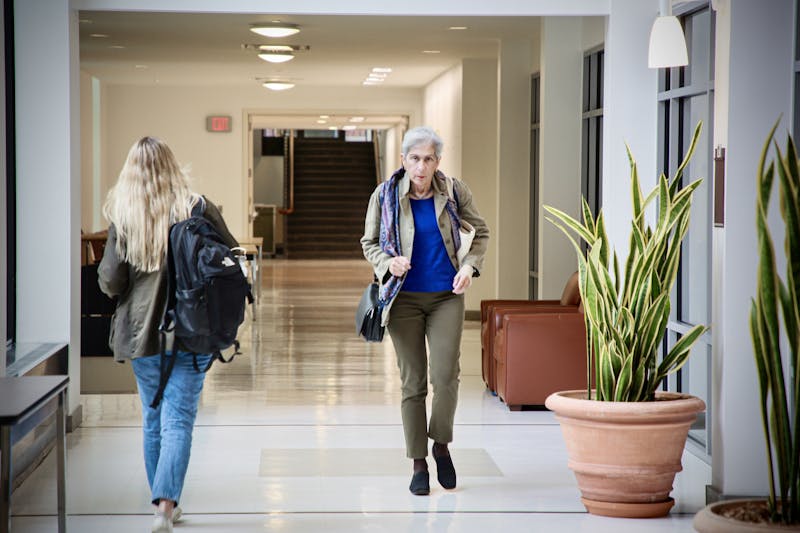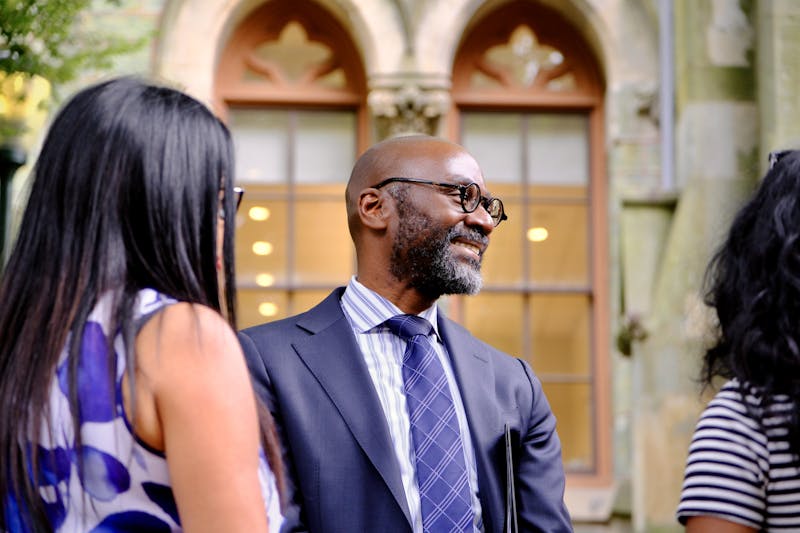
It's just before 10 p.m. on a Thursday night -- 21:49:17, to be exact -- and behind the glass wall at 4040 Chestnut Street, all is quiet for the time being.
But at any given moment, a phone call, camera or printout could deliver news of a crime in progress.
This is the command center for PennComm, the University of Pennsylvania Police Department's dispatch headquarters.
There are no windows back here -- the only view of the outside world comes through on 37 monitors while an army of computer equipment and telephones stand ready to alert dispatchers of developing situations.
Inside the huge room that PennComm encompasses are two hubs of activity: to the front, the main dispatch center; in the back, the Alarm Monitoring Position, otherwise known as the AMPs.
Every blue-light phone picked up, alarm sounded and reported complaint on campus is routed through this office.
The director of PennComm, Mitchell Yanak, will tell you that the life of a dispatcher is not easy.
Fourteen of PennComm's 21 full-time dispatchers work night shifts -- from 3 p.m. to 11 p.m. or 11 p.m. to 7 a.m. -- and the only way one is moved to a day shift is if another employee quits. Still, that's not the worst part of the job.
"The hard part for a dispatcher is they're always on the receiving end of someone in a crisis situation," Yanak explains. "They never find out what the final outcome of the situation is."
It's a job with tough hours, tough calls and tough responsibilities.
The following is an account of an hour spent behind the scenes at PennComm, watching the people who are constantly watching us.
•
On this Thursday night, dispatcher Andrea Childs, curly hair pulled into a ponytail, is manning the 33 television monitors and six different computer alarm systems that make up the AMPs.
On busy nights, usually Fridays and Saturdays, one employee keeps track of every beep, ding and dong that goes off around University property -- from fire alarms in Bennett Hall to forced-entry alarms in Sansom West. Another is responsible for what Yanak calls "proactive camera patrols." Other nights,a single dispatcher staffs the AMPs.
Such is the case on this night, when Childs sits alone at the alcove, eyes flitting from screen to screen. If she is not fielding calls from various emergency services departments, she is busy watching over Penn on the display of televisions placed around her desk.
•
During free moments, the monitors switch quickly from location to location: one moment a television is showing the entrance to the Penn Bookstore, the next it has flashed to bike racks in front of Pottruck Health and Fitness Center.
The excitement level of the job varies by the night, Childs admits.
Yanak can tell you that Friday nights, from about 7 p.m. until 3 a.m. on Saturday mornings, are the busiest hours for police departments across the nation, and Penn is no exception.
But does Childs feel that there are some nights when PennComm can become too much to handle?
"Not really," Childs explains. "Sometimes it's busy, and sometimes it's just not."
•
22:05:11: A message pops up on one of the computers splayed out around Childs.
An alarm has gone off in Steinberg-Dietrich Hall -- and it looks like someone might have gotten out through a door they were not supposed to be using.
A few moments later, however, the incident seems to be under control.
"We just got an alarm for an emergency access door," Childs says. "I just called the security guard there and everything is fine."
Next on her protocol list is logging the event into a computer that keeps track of all incoming calls and the measures taken after receiving them.
She documents that she spoke to security officer Green and that it was a false alarm.
One alarm down, an unknowable number to go before Childs' shift is over at 11 p.m.
22:09:24 p.m.: Another alarm sounds and one of the many machines starts spitting out a scroll of paper explaining that a fire alarm in Hamilton College House just went off.
Childs is back in action.
"So I just notified Fire," Childs says. "Now I have to notify Facilities."
Childs picks up her phone.
"Hi, it's Penn Police," she says to a Facilities employee on the other end of the line. "High Rise North. We just got a fire alarm."
She explains that in events like this, the UPPD sends over all of its mobile units, including the lieutenant. If the building actually needs to be evacuated, officers of the 18th District would be called in as well.
22:19:21: Another printout -- "The fire alarm was restored."
Childs explains that there was no fire in Hamilton after all.
Still, periodically for the next few minutes, Childs receives alerts that emergency doors are being opened in Hamilton as people respond to the alarm.
22:28:14: Childs' cameras zoom onto 38th and Walnut streets to watch a traffic stop being performed by members of the UPPD.
A few seconds later, an alarm sounds for a forced door in David Rittenhouse Laboratory. While one monitor now shows a close-up of the DRL door, another remains focused on the traffic stop on Walnut Street.
PennComm's cameras are powerful, with up to a two-block zoom capacity.
At one moment, Childs zooms into Allegro Pizza, getting in so close that the mushrooms on a steamy slice of pizza are visible.
"When you're walking down the street, you never know, we could be watching you walk by," she ruminates. "We see some crazy stuff on these cameras."
•
Toward the front of the room is the dispatch area -- the other half of PennComm -- where workers field the calls first picked up in the AMPs.
Here public safety employees shuttle information between officers from the UPPD and various parties who call in with complaints.
Dispatcher Jim Orman, with a big smile on his round face, is sitting in his chair, keeping a watchful eye on his screens while chatting with the various people walking around the area -- including those who have just arrived, ready for the shift's switchover at 11 p.m.
Orman is on what they call Channel One duty.
"One employee is on what we consider Channel One, and that employee is responsible for dispatching police or security guard personnel," Yanak explains.
Besides Channel One, there is another dispatcher at work, sending messages at different frequencies in order to provide students with walking escorts and other services provided by Allied-Spectaguard.
•
22:34:21: Childs runs over from her station at AMPs to say that a call has just come in from Harrison College House. It seems that there are three white males making trouble in one of the corridors.
Is there any more information on them, Orman wants to know before he dispatches officers to the scene.
"One is a white male, blond hair, red T-shirt on. No further identification on the other two," Child says, explaining that she also has the reporting person's name, and that the males are likely under the influence.
Orman transmits this information to police.
"Harrison College House -- 3910 Irving Street -- 13th floor," he says over the radio, adding that he is now "reporting that these males are intoxicated."
22:40:26: Orman, monitoring different locations, sees a man standing at the door of the Penn Bookstore and zooms in on him. After trying the door a few times, the man looks at his watch, shakes his head and then walks away.
Not everyone picked up on the cameras is a criminal. Still, Orman explains, the cameras are an important preventative measure.
"If we see anything suspicious, we don't even need a call -- we can just send someone over," he says.
He points out a bike rack on one of the monitors with one wheel attached to it.
"Here's an example where someone only chained up the front tire," he says, shaking his head. "So now the whole bike's gone -- just the tire is left."
22:52:56: A call comes in from the Philadelphia Police Department. Someone saw people fighting on the 3800 block of Walnut Street and called 911, but since that area is under the jurisdiction of the UPPD, the 18th District re-routed it here.
Orman moves the cameras to 38th and Walnut streets. Over on the corner, there are a group of people having a conversation, but it does not look like any sort of dispute to him.
Still, someone will be sent to assess the situation.
"We checked with all three cameras -- we don't see anything," he says over the radio. "Use caution."
22:56:09: "It sounds like they're looking for somebody to party with them," Orman says of the three guys on the loose in Harrison.
Then word comes that the guys were found, their names have been taken and the UPPD is making sure they belong in the building in the first place.
22:59:37: It's time for the 11 p.m. shift to take over. Orman stands up and unplugs his headphones, while the next dispatcher group quickly gets set up and tuned in.
"One of the things you notice when we switch over -- you hook up right away," Orman says.
Just as one shift winds down, another takes over immediately. Some shifts might be quieter than others, but no matter the day of the week or hour of the night, surveillance at PennComm -- like crime -- never sleeps.
The Daily Pennsylvanian is an independent, student-run newspaper. Please consider making a donation to support the coverage that shapes the University. Your generosity ensures a future of strong journalism at Penn.
DonatePlease note All comments are eligible for publication in The Daily Pennsylvanian.







